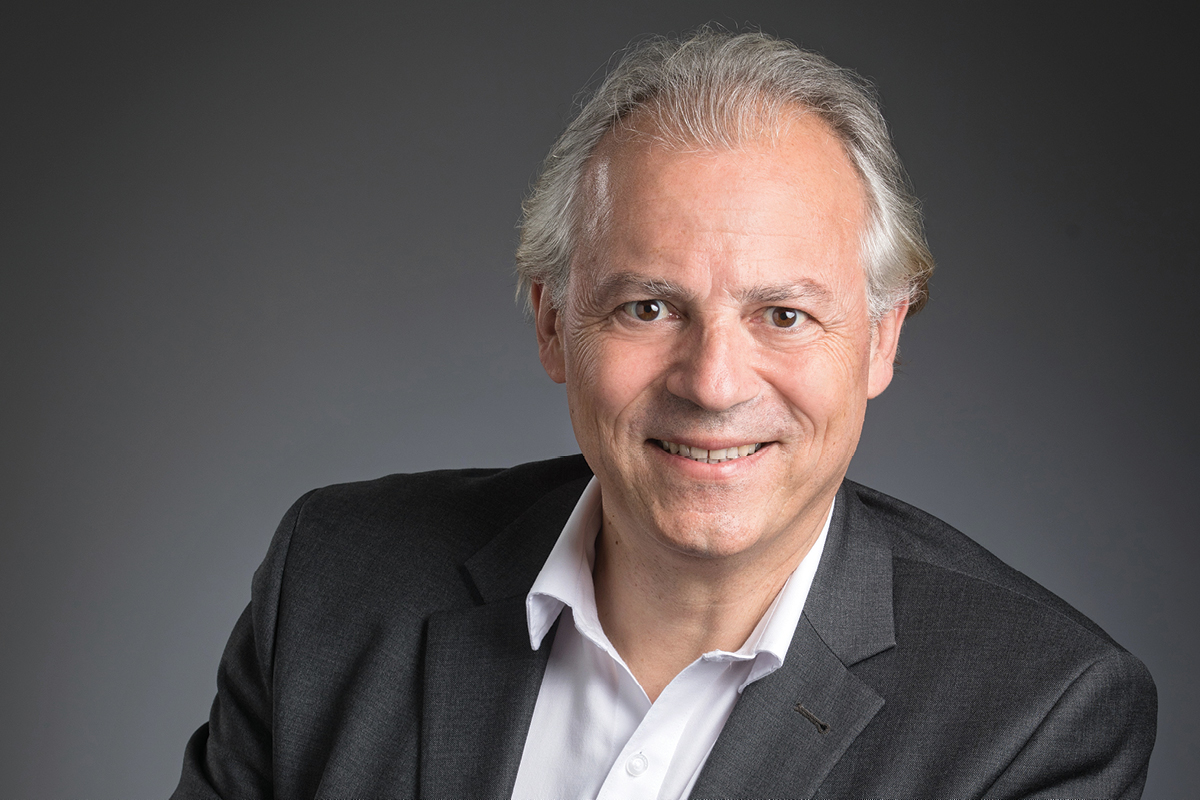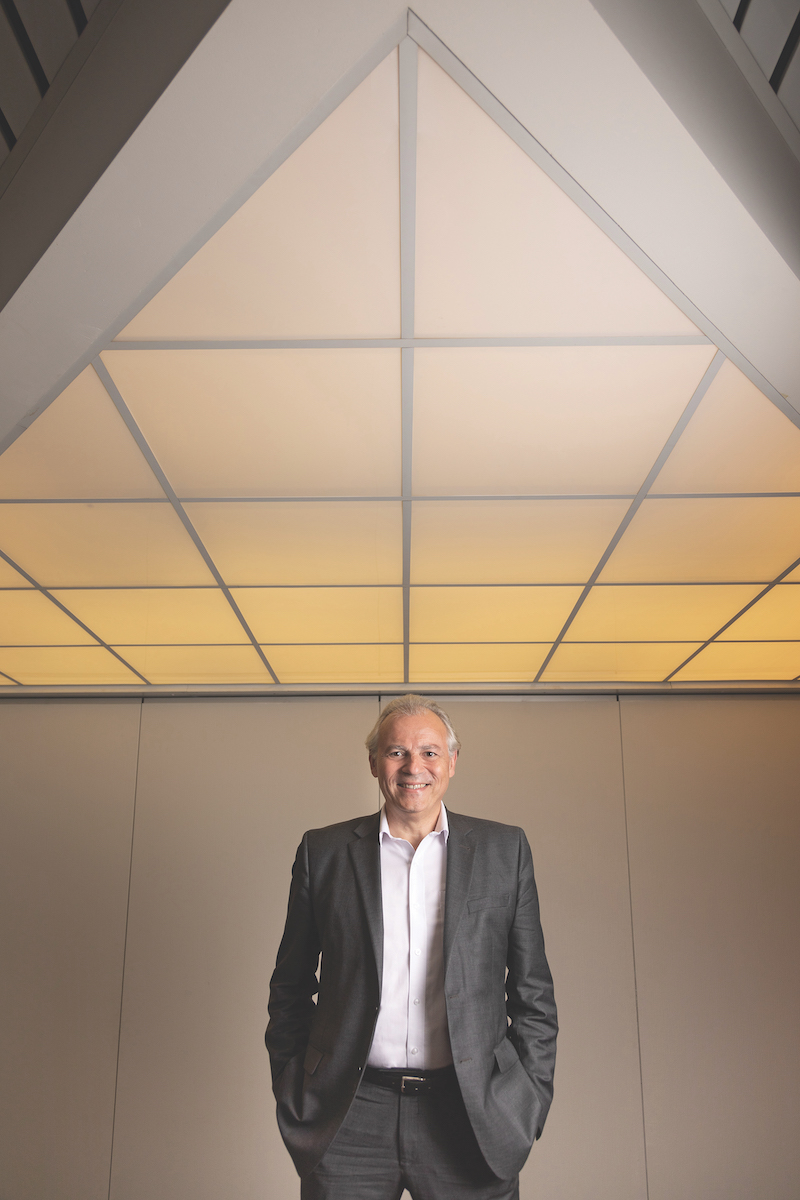Innovate and differentiate: Michel Denis
While other companies jostle with claims of low prices and high quality, Manitou Group CEO Michel Denis says his company’s rough-terrain service machines edge out the competition by delivering on promises of technological innovation and environmental sustainability.
The past two years have been a whirlwind of growth and expansion for Michel Denis, CEO of the French mechanical equipment manufacturer Manitou Group. New facilities, new subsidiaries and new products that have exceeded sales projections – all of these achievements have culminated in €1.9 billion in revenue in 2018, marking 40% growth during that period.

But success was never a given for this plucky producer of everything from rough-terrain telehandlers to forklifts, aerial work platforms to backhoes and compact loaders. With customers spread across construction, agriculture and industry, if it were not for Michel’s nimble stewardship and forward-thinking planning, Manitou may have been ensnared in the all-consuming gravity of global economic downturn.
"When not every market is going well, we focus on the ones that are," Michel says, explaining his decision to boost Manitou’s standing in the relatively vibrant construction sector through an aggressive program of research and development.
"The innovation we have achieved over the past two years has improved the efficiency of our machines and the security of our machines, not to mention reducing our users’ total cost of ownership, including maintenance and repairs," Michel says. "Customers recognise that we have improved the availability and performance of our machines, and our market share has grown."
Much of this growth is being invested back into the company, which has expanded its staff by 25% and opened a new research and development test centre in the past year alone.
A breath of fresh Oxygen
Beyond the benefits he has locked down on behalf of Manitou’s shareholders, Michel says he is most proud of the strides the company has taken on behalf of the earth as a whole.
"Sustainability is deeply ingrained in all of our processes. When we build solutions for our customers, we want them to be sustainable solutions," he says. "That means that our designs aim to use less oil and fuel and, therefore have less of an impact on the environment. It also means extending the lifetimes of our machines."
"Sustainability is deeply ingrained in all of our processes. When we build solutions for our customers, we want them to be sustainable solutions."
The jewel in Manitou’s sustainability crown is Oxygen – a label of low emission telehandlers and access platforms that provide the same performance as diesel-powered products. The company also has plans to release hybrid machines under the label. In May, Oxygen featured at the Urban Future Global Conference in Oslo as an "innovative solution for zero-emission construction sites".

"Oxygen is the definition of a different approach," Michel says, adding that this approach is perfectly in line with Manitou’s sustainability goals.
"We have a full strategy for low-emission machines. We are quite advanced compared to the competition in that area," he says. "We are developing sustainable solutions every day."
These solutions also include features that make even fuel-powered machines more efficient and, therefore, less prone to harmful emissions and more cost-effective for users.
"Four years ago, it was possible for users to collect data from five of our machines. But in January of this year, we decided that this needed to change. Today, 100% of our products collect data, which are shared with the user via smartphone," Michel says.
"This allows the consumer to minimise downtime, optimise management and improve performance.
"When you buy a Manitou, you have two machines – the physical machine on the ground and the digital machine in your hand."
Loyalty is the answer
All of this is not to say that Michel does not encounter challenges at the helm of Manitou. Unsurprisingly, however, those that he faces stem from the company’s enviable growth. "We have realised recently that some of our suppliers are limited and cannot keep up with us," Michel explains.
His solution is a combination of loyalty and transparency. "We try to build long-term relationships with our customers and our suppliers. We do not switch, and we do not change. In full transparency with them, we add partners to our supply chain to meet our customers’ needs," he says.
This way, none of Manitou’s suppliers are ever shocked to learn that they share clients with their competitors and peers. Manitou’s commitment to its suppliers mirrors its conduct toward its employees. With growth steady and long-time workers sporadically retiring from the 61-year-old company, Manitou is constantly searching for new talent. According to Michel, loyalty is also the secret to building a strong team.
"Just like any company, convincing workers to join is both crucial and difficult. But I can assure potential hires of one thing – once workers join us, they don’t often go away," Michel says.
"When you respect your people and give them opportunities to advance, you can do fantastic things within a company. So, while it can be difficult to attract new workers, we always retain them. It’s in our DNA."
Manitou by numbers
- 40% growth over two years
- €1.9 billion in revenue in 2018
- 25% employee growth in 2018
The future across the sea
Having found success in the European market, Michel says his current ambition is to harness the research, the positive company culture and the environmental consciousness he has cultivated at Manitou to create new markets abroad.
"We recently acquired a company in India," Michel says. "It’s not a huge volume – it’s around €40 million – but it’s still a very important move for us to have an industrial platform in emerging countries and to be able to develop products that are adapted to these environments."
He says he’s also looking forward to upcoming plans to launch four new products in Thailand that will be marketed across Asia and Africa. "When we launch products in a new country, we bring with us our high standards for safety, efficiency and working conditions, all while developing solutions specifically designed for that market," Michel says.
Beyond Asia, the Manitou CEO has also set his sights on the US – "the biggest market in the world for our products today". It also happens to be where the company’s market share is smallest.
But while cornering the US market would be Manitou’s white whale, Michel insists that a more realistic measure of success would be growth that is well planned and incremental.
"I would like to see our performance improve in the US. We have plans to organise our teams and launch a certain number of new products there – all we need to do is extend it in order to develop our market share," he says.
Proudly supported by: